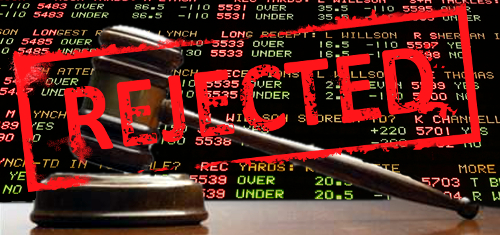 New Jersey’s quest for legal sports betting has gone down to defeat (again), leaving a longshot Supreme Court appeal as the state’s sole remaining legal option.
New Jersey’s quest for legal sports betting has gone down to defeat (again), leaving a longshot Supreme Court appeal as the state’s sole remaining legal option.
On Tuesday, nearly six months after the state squared off in the US Third Circuit Court of Appeals against the federal government, four major pro sports leagues and the NCAA, the Court issued a 10-2 ruling against New Jersey’s 2014 plan to offer legal sports betting at Atlantic City casinos and state racetracks.
The full Court was reconsidering an August 2015 ruling by a three-judge panel that said the state’s latest sports betting law – which didn’t expressly regulate betting but selectively repealed its prohibition at the aforementioned casinos and racetracks – amounted to a de facto authorization of betting, which is forbidden under the 1992 federal PASPA sports betting prohibition.
Judge Marjorie Rendell, who wrote Tuesday’s majority opinion (viewable in full here), left New Jersey with little option for going forward on a legislative basis, saying that the Court “continue to find PASPA constitutional” and that states “may not use clever drafting or mandatory construction provisions to escape the supremacy of federal law.”
New Jersey had argued that PASPA unnecessarily binds the hands of states, depriving them of making their own determination of sports betting’s legality, in essence, giving them only a binary choice between full prohibition or full repeal, and thus contravening the commandeering clause of the US Constitution.
But Rendell said this argument “sweeps too broadly.” While the Court found fault with New Jersey’s partial repeal, Rendell wrote that “other options may pass muster.” For instance, the state could expressly authorize bets between friends and family, although this would do nothing to financially shore up the casinos and tracks, as was the state’s original intention behind pushing for legal wagers.
Previous rulings had attempted to suggest potential paths forward that might be legally acceptable, but Rendell wrote that the Court “need not, however, articulate a line whereby a partial appeal of a sports wagering ban amounts to an authorization under PASPA, if indeed a line could be drawn. It is enough to conclude that the 2014 Law overstepped it.”
The two judges who had sided with the state in previous rulings cast the lone votes in favor of the state in Tuesday’s ruling. Writing for the dissenters, Judge Julio Fuentes said the majority judges had only inferred that New Jersey’s partial repeal was the same as authorization, and Fuentes said he “cannot agree with this interpretation.”
New Jersey state Sen. Ray Lesniak, a vocal champion of the state’s gaming industry, has publicly stated that the state will file a petition for appeal to the US Supreme Court, although he acknowledged that the likelihood of the Court agreeing to hear the appeal was slim. The Court declined to hear the state’s previous appeal in 2014.
However, Lesniak told ESPN that he also planned to “test the public’s, legislature’s and the governor’s temperature on repealing all our laws on sports betting and using the extensive police powers of the state to restrict the locations where sports betting can take place, for instance, like we do with gentlemen’s clubs.”